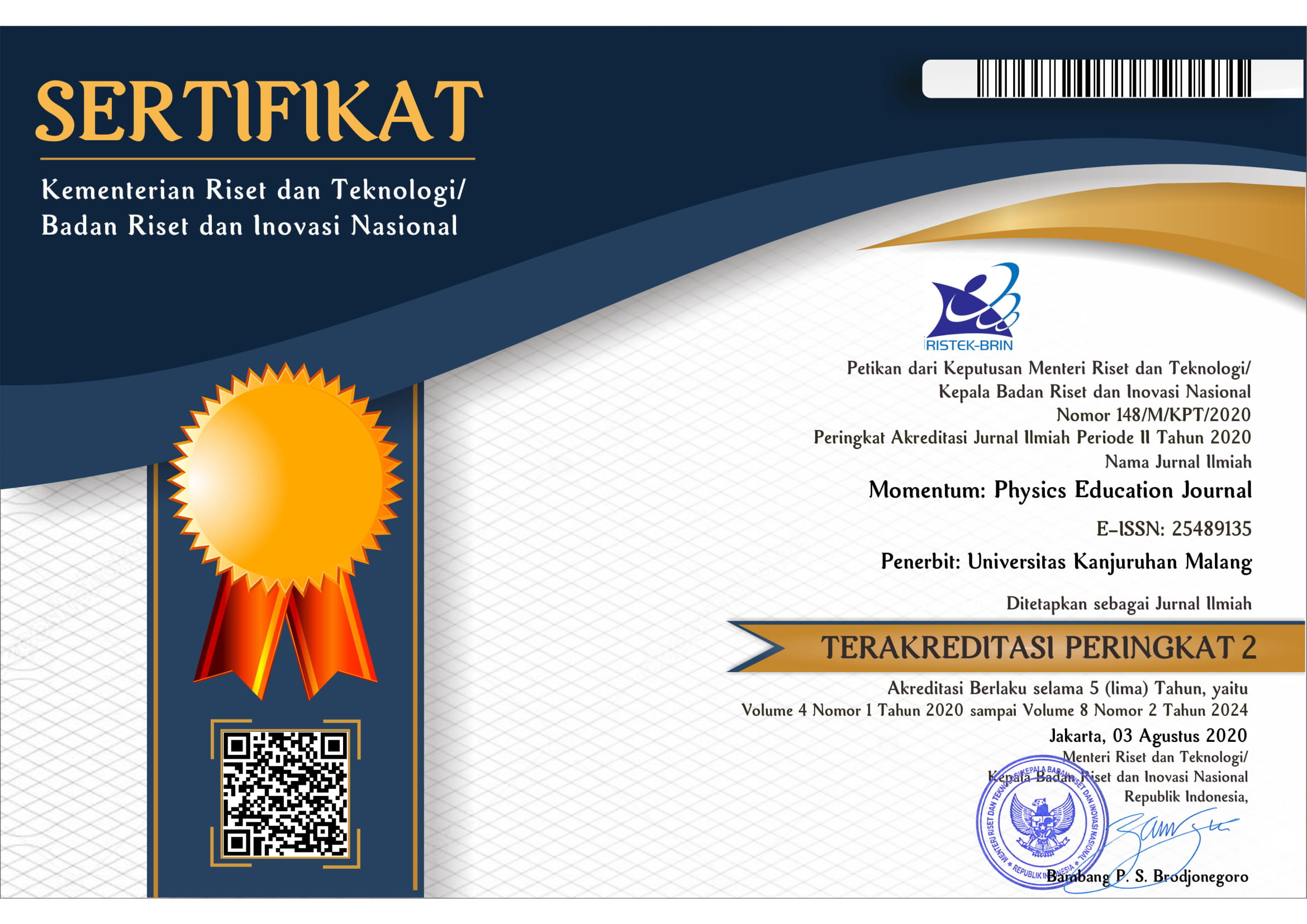Conceptual framework on teaching capacitors and inductors
DOI:
https://doi.org/10.21067/mpej.v5i2.5630Keywords:
physics education, teaching capacitors, teaching inductorsAbstract
The objective of this work is to suggest a conceptual framework on teaching capacitors and inductors in order to improve teaching abilities and to eliminate some fundamental misconceptions. The effort initially deals with resolution of physical structure and structural concepts/parameters of the devices and then resolves DC and AC responses of the inductors and capacitors. The resolutions are achieved by considering basic serious RL and RC circuits and resolving the circuits both theoretically and experimentally. As a result, an alternative teaching approach is offered and also a novel instructional material is developed and suggested. Some teaching clues are briefly inserted to guide teachers/instructors to reach a higher comprehension level. It is believed that the implications of the developed teaching material would be quite high and beneficial.
Downloads
References
Bilal Önder, E., & Önder, F. (2019). Students’ understanding of fundamental AC signal concepts. Canadian Journal of Physics, 97(11), 1225–1228. https://doi.org/10.1139/cjp-2018-0819
Carstensen, A.-K., & Bernhard, J. (2019). Design science research – a powerful tool for improving methods in engineering education research. European Journal of Engineering Education, 44(1–2), 85–102. https://doi.org/10.1080/03043797.2018.1498459
Chekour, M. (2018). The impact perception of the resonance phenomenon simulation on the learning of physics concepts. Physics Education, 53(5), 055004. https://doi.org/10.1088/1361-6552/aac984
Coppens, P., Van den Bossche, J., & De Cock, M. (2017). Student understanding of first order RC filters. American Journal of Physics, 85(12), 937–947. https://doi.org/10.1119/1.5003805
Costa, L. R. J., Honkala, M., & Lehtovuori, A. (2007). Applying the problem-based learning approach to teach elementary circuit analysis. IEEE Transactions on Education, 50(1), 41–48. https://doi.org/10.1109/TE.2006.886455
Demirci, N., & Çirkinoğlu, A. (2004). Öğrencilerin elektrik ve manyetizma konularında sahip oldukları ön bilgi ve kavram yanılgılarının belirlenmesi. Journal of Turkish Science Education, 1(2), 116–138. http://www.tused.org/index.php/tused/article/view/46
Ding, L., Jia, Z., & Zhang, P. (2020). From learning capacitance to making capacitors: The missing critical sensemaking. International Journal of Science and Mathematics Education, 1–17. https://doi.org/10.1007/s10763-020-10112-7
Goodman, L. (2015). Effects of a dialogical argumentation instructional model on science teachers’ understanding of capacitors in selected Western Cape schools [University of the Western Cape]. https://etd.uwc.ac.za/handle/11394/5062
Hasanah, U. (2020). The effectiveness of STEM education for overcoming students’ misconceptions in high school physics: Engineering viewpoint. Science Education International, 31(1), 5–13. https://doi.org/10.33828/sei.v31.i1.1
Jao, J.-C. (2016). Effectiveness of team-based learning on academic performance in an electric circuit theory course for health sciences students. World Transactions on Engineering and Technology Education, 14(2), 277–281. http://www.wiete.com.au/journals/WTE&TE/Pages/Vol.14, No.2 (2016)/07-Jao-JC.pdf
Kezerashvili, R. Y. (2012). Teaching RC and RL Circuits using computer–supported experiments. IERI Procedia, 2, 609–615. https://doi.org/10.1016/j.ieri.2012.06.142
Li, J., Singh, C., Rebello, N. S., Engelhardt, P. V., & Singh, C. (2012). Students’ difficulties with equations involving circuit elements. 243–246. https://doi.org/10.1063/1.3680040
Mitkowski, S. A., Dąbrowski, A. M., Porębska, A., & Kurgan, E. (2010). Electrical engineering education in the field of electric circuits theory at AGH University of Science and Technology in Kraków. Proc. 1st World Conf. on Technol. and Engng. Educ, 47–53. http://www.wiete.com.au/conferences/2wctee/papers/8-10-Mitkowski.pdf
Newburgh, R. (2002). Conceptual difficulties with rates of change, or Zeno redux. Physics Education, 37(2), 147–151. https://doi.org/10.1088/0031-9120/37/2/308
Pulé, S. (2012). Students’ versatility with resistor-capacitor circuits. International Journal of Electrical Engineering and Education, 49(4), 419–443. https://doi.org/10.7227/IJEEE.49.4.5
Salar, R., Emine, U., Karaman, İ., & Turgut, Ü. (2016). Fizik öğretmeni adaylarının 12. sınıf elektrik ve elektronik konusunu ile ilgili bilgi düzeyleri. Trakya Üniversitesi Eğitim Fakültesi Dergisi, 6(1), 41–54. https://dergipark.org.tr/en/pub/trkefd/issue/21483/230223
Serway, R. A., & Jewett, J. W. (2018). Physics for scientists and engineers (3rd ed.). Cengage Learning.
Sterian, A., Adamczyk, B., & Rahman, M. M. A. (2008). A project-based approach to teaching introductory Circuit Analysis. 2008 38th Annual Frontiers in Education Conference, S1F-3-S1F-8. https://doi.org/10.1109/FIE.2008.4720491
Stoyanov, I., Evstatiev, B., Iliev, T., & Mihaylov, G. (2019). Adaptive learning for virtual investigation of capacitors’ electrical and physical properties. 2019 IEEE 25th International Symposium for Design and Technology in Electronic Packaging (SIITME), 58–61. https://doi.org/10.1109/SIITME47687.2019.8990834
Trajkovic, L. (2011). Teaching circuits to new generations of engineers. 2011 IEEE International Symposium of Circuits and Systems (ISCAS), 1187–1190. https://doi.org/10.1109/ISCAS.2011.5937781
Young, H. D., Freedman, R. A., & Ford, A. L. (2011). Sears and Zemansky’s University Physics: With modern physic (13th ed.). Addison-Wesley.
Downloads
Published
How to Cite
Issue
Section
License
Momentum: Physisc Education Journal allows readers to read, download, copy, distribute, print, search, or link to the full texts of its articles and allow readers to use them for any other lawful purpose. 
This work is licensed under a Creative Commons Attribution 4.0 International License. The Authors submitting a manuscript do so with the understanding that if accepted for publication, copyright of the article shall be assigned to Momentum: Physics Education Journal


.png)
.png)
.png)
.png)





